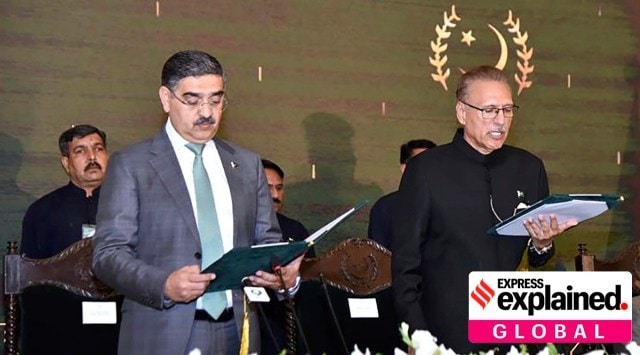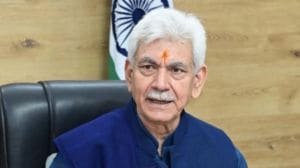Who is Anwaar-ul-Haq Kakar, the new caretaker Prime Minister of Pakistan?
Kakar has been serving a six-year term in Pakistan's Senate since 2018 and local media has reported that he is a part of the Balochistan Awami Party, which is widely considered close to the military.
 In this photo released by Pakistan's President Office, President Arif Alvi, right, administrates oath from Anwaar-ul-Haq Kakar as caretaker Prime Minister during a ceremony, in Islamabad, Pakistan, Monday, Aug. 14, 2023. (AP/PTI)
In this photo released by Pakistan's President Office, President Arif Alvi, right, administrates oath from Anwaar-ul-Haq Kakar as caretaker Prime Minister during a ceremony, in Islamabad, Pakistan, Monday, Aug. 14, 2023. (AP/PTI) Anwaar-ul-Haq was sworn in as the new interim Prime Minister of Pakistan on Monday (August 14).
His appointment came after the dissolution of Pakistan’s Parliament last Wednesday (August 9) – three days before the legislative body would have completed its five-year tenure. Then Prime Minister Shehbaz Sharif and opposition leader Raja Riaz agreed to name Senator Kakar as the caretaker premier.
At the top of Kakar’s list of agendas will be naming a cabinet for the caretaker government and ensuring free and fair elections. Under Pakistan’s constitution, a neutral caretaker government oversees the national elections, which must be held within 90 days of the dissolution of the parliament’s lower house. This means elections are ideally to be held around early November.
Who is Anwaar-ul-Haq Kakar?
Kakar, 52, hails from the southwestern province of Balochistan, a region bordering Afghanistan that has witnessed internal turmoil at times in the country’s history. According to the channel Geo News, Kakar studied in the city of Quetta and later went to London for his higher education, returning to Pakistan in 2005.
President Alvi approved Kakar’s appointment, the president’s office said in a statement. He is not particularly well-known even within the political circles of Pakistan. A member of the outgoing ruling coalition told the Pakistani media organisation Dawn that Kakar was a “surprise” for many in the alliance government itself.
He has been serving a six-year term in Pakistan’s Senate since 2018, according to its official website. He was a part of the Balochistan Awami Party, which is widely considered to be close to the military. “Owing to the fundamental responsibility conferred upon me as the caretaker Prime Minister, I have decided to surrender my membership of the Balochistan Awami Party (BAP) and relinquish my Senate position,” he said in a post on X (formerly known as Twitter) on Sunday evening.
Pakistan Tehreek-e-Insaaf or PTI, the party of former Prime Minister Imran Khan, expressed hope that Kakar would ensure free, fair and credible elections. “If there are questions over the credibility of elections, there will be no political stability, which is critical for economic certainty,” former foreign minister Shah Mahmood Qureshi, who is currently leading Khan’s party, said in a TV interview.
Why has the Pakistan Parliament been dissolved?
While the Parliament was close to completing its full term, continued political and economic turmoil may have been behind the decision. Days prior, on August 5, Imran Khan was arrested and convicted of corruption charges in the Toshkhana case and sentenced to three years in prison. He is now barred from contesting elections for five years.
At the same time, a digital census of 2023 was approved in haste recently by a constitutional body called the “Council of Interests”, consisting of the Pakistan PM, four Chief ministers of Pakistan’s provinces, and three members nominated by the PM (usually cabinet ministers) recently. It has put Pakistan’s population to be at 24 crore, up from 21 crore in the 2017 census.
Now, the law mandates that there should be delimitation or drawing up of constituencies based on the changes in population before the next elections, and that process would officially take 120 days, leading to possible delays in the election.
Further, since July 1 a series of legislative changes have been introduced that will now let the caretaker government take far-reaching decisions beyond day-to-day affairs rather than play a nominal role. It is being speculated that through an Army-backed caretaker PM, the Pakistan Army will bring about some changes in the country’s political and economic setup.
(With Reuters inputs)






- 01
- 02
- 03
- 04
- 05
































